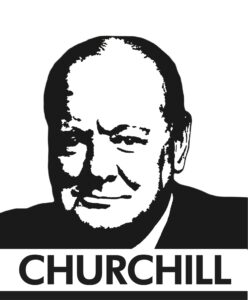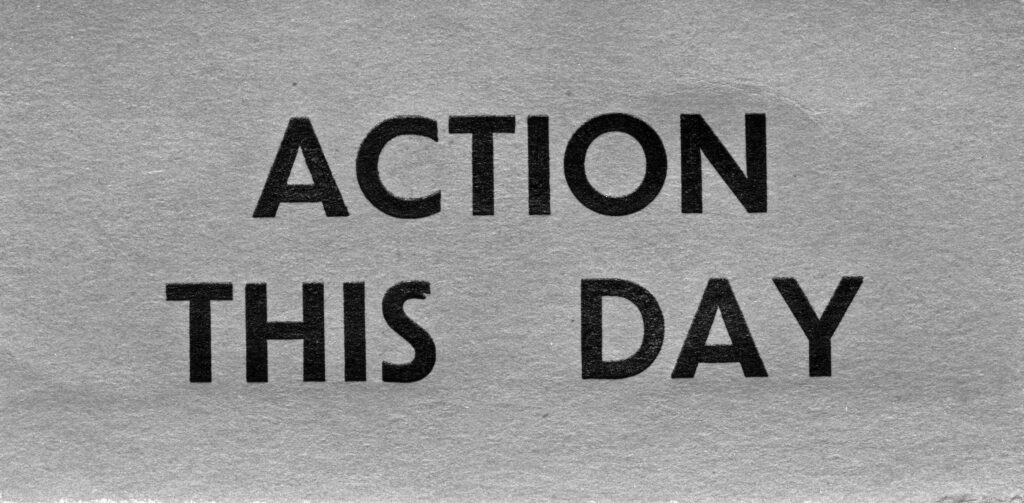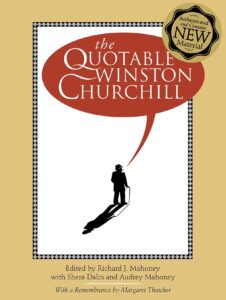
Finest Hour 197
Action This Day – Summer 1897, 1922, 1947

March 31, 2024
Finest Hour 197, Third Quarter 2022
Page 42
By Michael McMenamin
125 Years Ago
Summer 1897 • Age 22
“Barbarous Squalor”
In India, Churchill was bored until the late summer. Nothing much had changed since April, when he wrote his mother about “the barbarous squalor of this country….The only valuable knowledge I take away from India (soldiering apart) could have been gathered equally well in Cumberland Place.”
His frustration was compounded by the apparent failure of Sir Bindon Blood to appoint him to his staff on the Malakand Field Force, as he had promised. But then a message arrived from Blood: “I had to fill my personal staff when I started and I have not been able to manage a billet for you as yet. I should advise your coming to me as a press correspondent and when you are here I shall put you on the strength on the 1st opportunity.” Blood meant he would appoint Churchill once a vacancy was created when an officer of his was “killed in action.”
Churchill promptly cabled his mother on 28 August, asking her to find a newspaper willing to engage him as their correspondent. The next day, he wrote to her, foreshadowing his later practice of writing to her in some detail about his battlefield experiences in Afghanistan, Sudan, and South Africa. Having faced no danger but boredom that summer did not deter him from writing to her about the dangers he might face in the coming days.
100 Years Ago
Summer 1922 • Age 47
“Tell Winston We Could Never Have Done Anything Without Him”
Churchill was uncharacteristically modest in his book The Aftermath when downplaying his role in the negotiations that led to the peace treaty between Great Britain and Ireland in late 1921: “I only played at this time a part of second rank in Irish Affairs.…” Yet during those negotiations, he formed a rapport with Michael Collins that served them both well in the summer of 1922. It was then that Collins—at Churchill’s urging—abandoned his earlier attempts that year to reach an honorable accommodation with the duplicitous Eamon de Valera, who had sent him to London to negotiate a treaty and then denounced him when Collins did not bring back what de Valera knew from the outset was impossible. Instead, Collins fought back, chose freedom for Ireland, and waged war against de Valera and some of his former comrades in the Irish Republican Army (IRA) who were attempting through violence and terrorism to overthrow the elected government of the new Irish Free State.

2025 International Churchill Conference
The Aftermath was the first, and remains today the best and most complete, account of what Collins and Churchill went through in 1922 to reach the point where Collins believed he had no choice but to wage war by shelling the Four Courts building in Dublin held by IRA rebels. In this way he could preserve the new Free State and the accomplishments of the Irish Republican Brotherhood in the Anglo-Irish War of 1919–1921.
Churchill’s portrait of Collins illustrates how well he managed to understand him and gain his trust:
Michael Collins had not enjoyed the same advantages in education as his elder colleague [Arthur Griffith]. But he had elemental qualities and mother wit which were in many ways remarkable. He stood far nearer to the terrible incidents of the conflict than his leader [de Valera]. His prestige and influence with the extreme parties in Ireland for that reason were far higher, his difficulties in his own heart and with his associates were far greater.
As part of Collins’ attempts to reach a conciliation with de Valera and the IRA, the two agreed on 20 May to a division of seats in the June elections to the new Irish Parliament: Free State supporters were to have 64 seats, treaty opponents were to have 57. Churchill opposed this, but rather than say so in a letter, he invited Collins and Griffith—who opposed the Collins-de Valera Agreement— to London for discussion. Collins and Griffith spent three days with Churchill, from 27 to 29 May, and persuaded him that free elections would have been impossible because “Small bands of armed men could have seized and destroyed the ballot boxes and in other ways prevented the free exercise of constitutional rights.” Collins promised he would stand by the treaty because he would have a majority in the new legislature, however small. As Martin Gilbert wrote, “Churchill, [Prime Minister] Lloyd George and [Conservative Leader] Austen Chamberlain were impressed by these arguments. Certainly, Collins appeared to be seeking a conciliatory solution within the Treaty,” whereas the Northern Ireland Prime Minister, Sir James Craig, had recently “issued a direct challenge to the Treaty.”
On 30 May, Churchill persuaded the Cabinet to support the Collinsde Valera Agreement. On 31 May, Churchill’s speech in the House of Commons gave a complete account of the Irish situation, including a defense of the Collinsde Valera Agreement and the good faith of Collins and the Free State Government. The next day, Austen Chamberlain wrote to the King describing Churchill’s speech: “It was a masterly performance— not merely a great personal and oratorical triumph, though it was both of these, but a great act of statesmanship.”
More importantly, Michael Collins had heard the speech. As Churchill wrote:
Immediately after the debate, Michael Collins, who had listened to it, came to my room…interested in the debate. “I am glad to have seen it” he said “and how it is all done over here. I do not quarrel with your speech”….Before he left he said “I shall not last long; my life is forfeit, but I shall do my best. After I am gone it will be easier for others. You will find they will be able to do more than I can do.”…I never saw him again.
On 28 June at 4 am, Free State Army troops—acting upon the orders of Collins and using artillery supplied to them by the British Army and approved by Churchill— opened fire on the Four Courts building occupied by the IRA. As Churchill wrote, “This cannonade was in fact the salute which celebrated the foundation of the Irish Free State.”
On 22 August, Collins, in Churchill’s words, “moving audaciously about the country rallying and leading his supporters in every foray, was killed in an ambush” by IRA forces. Posthumously, Churchill wrote, Collins “sent me a message through a friend for which I am grateful. ‘Tell Winston we could never have done anything without him.’”
75 Years Ago
Summer 1947 • Age 72
“The Great Man’s Breadth of View”
With summer came independence for India and, with it, the civil war between Hindus and Muslims that Churchill had predicted would follow. The House of Commons was presented with an Indian Independence Bill on 4 July, stating that “HM Government in the United Kingdom will have no responsibility for the government of any of the territories now included in British India.”
India was divided in two: Muslim Pakistan, whose Prime Minister was to be Mohammed Ali Jinnah, and Hindu India, whose Prime Minister was to be Jawaharlal Nehru. Lord Louis Mountbatten was to be Governor-General of both India and Pakistan. It was widely known at the time, however, that Nehru and Mountbatten were very close and that Nehru and Mountbatten’s wife Edwina were involved in a love affair, possibly platonic, but nonetheless very real. At the last minute, Jinnah unexpectedly refused to consent to Mountbatten as Governor-General of Pakistan and insisted he become Governor-General in his place.
Governor-General is a largely ceremonial position, so the Attlee government was prepared to agree, but they did not want Churchill to throw a spanner in their spokes by objecting. On 8 July, at Attlee’s request, Churchill’s wartime adviser General Ismay flew to London from India, where he was Mountbatten’s Chief of Staff. He went to Chartwell to seek Churchill’s approval of this latest development. According to Alan Campbell-Johnson, Ismay’s Press Officer, “Any expectations Ismay may have had of a difficult interview with the great man were quickly dispelled.”
Churchill agreed to support the Attlee government if it acquiesced to Jinnah’s demands, for he considered Mountbatten’s role in the next few months as vital in “mitigating communal tensions.” Campbell-Johnson noted in his diary: “This decisive expression of opinion, combining as it did the great man’s breadth of view and immediate grasp of essentials with his ability to relate his exact ideas to perfect logic, set everybody’s mind at rest.”
Subscribe
WANT MORE?
Get the Churchill Bulletin delivered to your inbox once a month.





